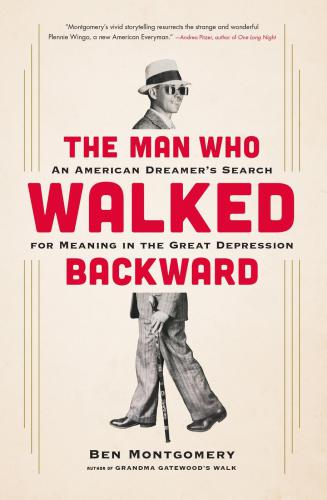
The Man Who Walked Backward
An American Dreamer's Search for Meaning in the Great Depression
کتاب های مرتبط
- اطلاعات
- نقد و بررسی
- دیدگاه کاربران
نقد و بررسی

July 15, 2018
From the strange-but-true annals, a wild ride through the Depression era, one foot at a time.Plennie Wingo (1895-1993) was an Abilene restaurateur who got on the wrong side of the revenuers by buying and selling bootleg alcohol during Prohibition. He wasn't alone: By Montgomery's (Grandma Gatewood's Walk: The Inspiring Story of the Woman Who Saved the Appalachian Trail, 2014) account, half of the court cases in 1928 in Texas had to do with booze. Nor was he alone in seeing his finances crumble to dust in the stock market crash and ensuing yearslong financial downturn. But Wingo was nothing if not entrepreneurial, and he hit on an idea that was both fundraiser and protest--and, writes the author at an appropriately onrushing pace, "when a certain kind of man has a certain kind of idea, one that he considers good, that good idea takes hold of him and it swells behind his eyeballs and expands, balloon-like, so big that it crowds out all the other thoughts and ideas." That idea was to walk across America, and maybe Europe, too, backward, selling postcards and other mementos of his madcap endeavor to support his family. It worked: Wingo remains in the record books, and he saw history unfold and had wondrous and sometimes fraught experiences ("he had barely made it through the gate of a fortified village at the foot of the ancient Bohemian castle when he noticed that the peasants seemed like they wanted to kill him"). There's a feel at times that Montgomery is bewitched by the open spaces; his many-paged reverie on the Great Plains and their Indigenous inhabitants ("the Indians submitted and the buffalo rotted and the plains sat empty") seems as if it really belongs in another book. Still, following Wingo's travels makes for a pleasing enough read.A minor-episode-in-history yarn that gets spun out a couple of dozen pages too long but that has legs all the same.
COPYRIGHT(2018) Kirkus Reviews, ALL RIGHTS RESERVED.

July 16, 2018
The Great Depression’s rampant unemployment sparked countless record-breaking attempts; Amelia Earhart’s famed transatlantic flight, for example, but also desperate novelty acts that captured the public’s attention. Montgomery’s cheerful narrative focuses on the latter, specifically one perpetrated by the ever-optimistic Plennie Wingo, who, having lost his businesses after being busted for selling alcohol during Prohibition, set out in 1931 to walk backward around the world, hoping that he could cash in by shilling for businesses along his way. Wingo’s adventures through the Dust Bowl–ravaged South, Bulgarian archaeological sites, and even 1931 Berlin, which was obsessed with new politician Adolf Hitler, see him stroll backward through many of the era’s historically significant events. The small-town Texan had a knack for marketing, but it is his genuine interest in people—regardless of race, color, or religion—that shines through: he befriends a black family in Pennsylvania and serendipitously enjoys tea with Queen Maria of Yugoslavia. Montgomery corroborates Wingo’s own written account with multiple news stories from places along the 8,000-mile route, making it all the more striking when discrepancies suddenly arise between Wingo’s account of his Turkish adventure, which resulted in a mysterious source of money, and that of the U.S. government, which investigated him over the money. After a year and a half, he returned home claiming success. Writing for casual readers, Montgomery keeps the focus on the human interest narrative, resulting in a light, enjoyable, telling of Wingo’s walk backward into the record books.

September 15, 2018
Montgomery (Grandma Gatewood's Walk) utilizes his background in journalism to illuminate a most intriguing Depression-era character. Texan Plennie Wingo lost his fortune after the 1929 crash. Desperate for a dollar, he took on a bizarre money-making adventure: walking backward across the world. Montgomery follows Wingo's journey through the Dust Bowl and the Hoovervilles, meandering through the American landscape, painting its history and people along the way. Readers will pass through towns that boomed and busted, meet kind strangers who take in a traveler, and imagine big crowds forming to see the man as he walks into town backward. Wielding both the big brush of historical context and the fine comb of biographical detail, Montgomery's text reads as good literature, taking a seemingly peculiar stunt and drawing out the humanity of the man and his era. VERDICT All American history readers should wander and wonder with Wingo, whose tale is elegantly sketched out here.--Jeffrey Meyer, Mt. Pleasant P.L., IA
Copyright 2018 Library Journal, LLC Used with permission.

August 1, 2018
As Plennie Wingo would later say, it seemed like the whole world was going backward in 1931. As the Great Depression ravaged the nation after years of prosperity, the former caf� owner in Abilene, Texas, decided to attempt something that had never been done before?walking around the world backward. So he outfitted himself with sunglasses that held mirrors so he could see behind him, plus a walking stick, and, after some training, set out in search of fame and fortune. He garnered a certain amount of fame in newspaper articles and newsreels, but, as this excellent window into Depression-era America shows, fortune was quite a bit harder to come by. Montgomery relates Wingo's adventures?from scrapes with police officers and gypsies to a feud with a ship's steward that escalated to epic proportions?with a down-home wittiness and frankness that perfectly match Wingo's own plainspoken, earnest manner. From Abilene to Chicago, New York, Berlin, Istanbul, and beyond, Wingo's trek captures a moment when, despite everything going wrong, the belief persisted that, with the right spirit, anything could be accomplished.(Reprinted with permission of Booklist, copyright 2018, American Library Association.)

























دیدگاه کاربران